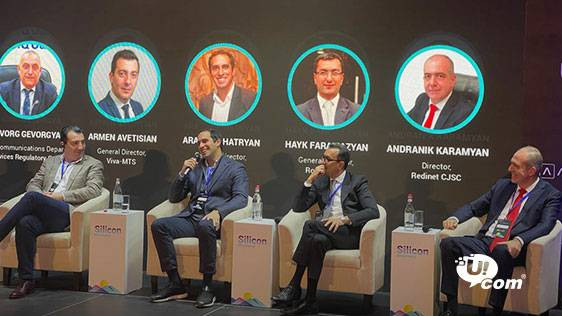“Smart Infrastructures” panel discussion in participation of the ICT companies and Public Services Regulatory Commission
The panel discussion “Smart Infrastructures” organized as part of the “Silicon Mountains 2022” year-end international tech summit brought together heads and representatives of Armenia’s information and telecommunication community and Public Services Regulatory Commission. The panel discussion was attended by the general managers of Viva-MTS, Ucom, Rostelecom Armenia, as well as Redinet, the head of the telecommunications department of the Public Services Regulatory Commission, Gevorg Gevorgyan, and the Chairman of the Union of Employers of Information and Communication Technologies, Armen Baldryan.
Smart infrastructures define perspectives for becoming a smart country. Information and telecommunication companies play a fundamental role in creating, developing, and maintaining smart infrastructures.
Smart infrastructures are aimed at solving the many problems that states and societies face, through introducing infrastructure and technological solutions and instruments. Traffic, water supply, urban development, production processes, public transportation, emissions, pollution, digitalization, electronic governance, sustainable environment, exploitation of natural resources, public services, healthcare, public safety, education are only some of the spheres, which require introduction of smart infrastructures fundamental in terms of life quality, as well as making the country more attractive for people and economic investments and ensuring economic growth. At the heart of smart infrastructure are the successful connections that are set between people, social capital, as well as information and telecommunication technologies, which will let provide sustainable development and improved quality of life.
Read also
“During the Silicon Mountains summit, the participants presented global trends, their experience and vision regarding expected developments caused by the use of modern and forward-looking technologies in society, the state system and the private sector, and Armenia’s place and role in those developments. All panel discussions were conceptual. The viewpoints formed as a result of discussions, and why not, debates, will be presented in the form of a package proposal to the RA Government, the private sector and all interested parties,” said Armen Baldryan, the Chairman of the ICT Employers’ Union.
“The presence of smart infrastructure in the field of telecommunications is primarily conditioned by the introduction of mobile and fixed broadband, high-speed networks and providing access to them for various sectors of the population and economy. In particular, as such networks can be considered the latest generation networks based on fixed fiber optic technology (PON/GPON) and mobile 4G+ (LTE Advanced) and 5G technologies (including IoT “Internet of Things” networks), the implementation and widespread distribution of which in the territory of the republic is pursued by the regulatory body of the telecommunications sector, the commission,” said Gevorg Gevorgyan, Head of the Telecommunications Department of the PSRC.
“The United Nations predicts that by 2050 70% of the world’s population will live in cities, and urbanization will add another 2.5 billion people to the population of cities around the globe, which inevitably forces us to think about the most efficient and smarter use of scarce resources. Along with the modernization of the infrastructure of the Armenian telecommunication companies, not only the usage of mass market IoT solutions will increase, but also there will be a demand from the city authorities to support the smart, efficient, and data analytics-based management of the expanding cities. That will certainly require serious investments not only from the operators, but also from many other pillars of the economy,” said Ara Khachatryan, Director General at Ucom.
“As a subsidiary of MTS, Viva-MTS has a hands-on experience and technological resources that let it introduce smart solutions and functions to ensure higher efficiency of infrastructures and services, including real time data accumulation, analysis and improvement of processes. We have already started cooperation with the state and community structures towards the introduction of smart technological solutions,” Viva-MTS General Director Armen Avetisian said.
“Next year, we plan to create and put into operation a rather serious data center, which will include all kinds of services, from colocation to cloud solutions. In this regard, the role of infrastructure is very important, because consumers, whether they are from the private or public sector, will be given the opportunity to use centralized services, getting the necessary solutions – Internet, data storage, virtual servers, etc., from one place. It can be confidently said that this trend will move Armenia, and in particular the IT sector, to another, higher level, by fundamentally changing the role of infrastructures as well,” said Hayk Faramazyan, General Director of “Rostelecom Armenia”.
“It has never been more necessary to create sustainable and smart infrastructures than now. Smart infrastructure creates a system that connects the real world with the digital world. On the one hand, it seems that it requires making serious investments, but on the other hand, it gives the opportunity to get more at a lower price. Applying Smart Infrastructure to economic infrastructure allows owners and operators to get more out of what they already have by increasing capacity, efficiency and flexibility. Smart infrastructure will shape a better future,” Redinet company director Andranik Karamyan said.
The panel discussion was attended by mass media, business analytics, experts and representatives of other sectors of the economy interested in introduction of smart infrastructure.





















































